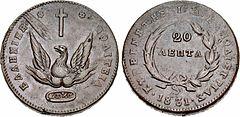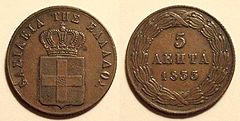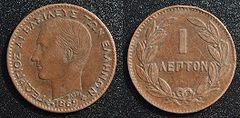.jpg)
The lepton, plural lepta (Greek: λεπτόν, pl. λεπτά), is the name of various fractional units of currency used in the Greek-speaking world from antiquity until today. The word means "small" or "thin", and during Classical and Hellenistic times a lepton was always a small value coin, usually the smallest available denomination of another currency.[1]
The coin in the lesson of the widow's mite (Mark 12:41–44, Luke 21:1–4) is referred to as a lepton and Luke's Gospel also refers to the lepton or mite when stating that a person who does not make peace with his adversary in good time will be required to pay 'to the very last mite' before being released from prison.[2] In the Hasmonean Kingdom the lepton was first minted under Alexander Jannaeus prior to 76 B.C.E.[3]
In modern Greece, lepton (modern form: lepto, λεπτό) is the name of the 1/100 denomination of all the official currencies of the Greek state: the phoenix (1827–1832), the drachma (1832–2001) and the euro (2002–current) – the name is the Greek form of "euro cent". Its unofficial currency sign is Λ (lambda).[1] Since the late 1870s, and until the introduction of the euro in 2001, no Greek coin had been minted with a denomination lower than 5 lepta.
References
- ^ a b Fleur de Coin - Greek 50 Lepta Coins
- ^ Luke 12:59
- ^ Coins of the Bible Set 2 of 3, Whitman Publishing, LLC, 2004. ISBN 0-7948-1889-7
External links




